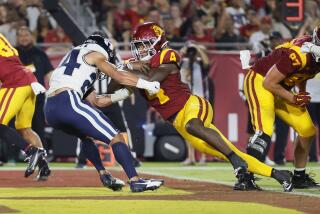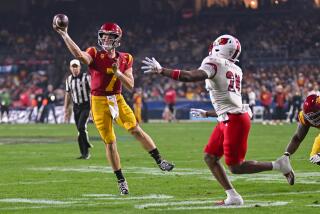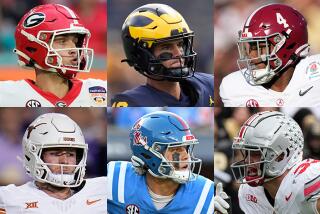Sugar and Spice
- Share via
It’s safe to say the bowl championship series standings were never intended to be fodder for conspiracy theorists.
They were honestly inspired to help dispassionately resolve, short of a playoff, how best to determine college football’s champion.
“The accuracy and fairness of the system would be the last thing I’d think the system would be attacked on,” Charles Bloom, the Southeastern Conference associate commissioner who helped develop the BCS standings, said this week.
Boy was Bloom wrong.
The 6-year-old system is careening toward another controversial finish as USC and Louisiana State jockey for the No. 2 spot and the right to play Oklahoma for the national title in the Sugar Bowl on Jan. 4.
The BCS standings combine subjective polls, computer rankings and schedule strength to ferret out the title contenders.
“It’s like a tiebreaker,” Bloom said.
This checks-and-balances system, however, has not quelled the debate.
In 2000, Florida State edged Miami for the No. 2 spot by 0.34 of a point, even though Miami had defeated Florida State.
In 2001, Nebraska won a trip to the national-title game by the margin of 0.05 over Colorado, which had defeated Nebraska, 62-36.
This year’s race also may come down to the very last byte.
USC leads LSU by 1.53 points, but the Tigers might narrow the gap to decimal points if both schools win important weekend games. USC plays host to Oregon State and LSU plays Georgia in the SEC title game.
With the stakes high and emotions charged, many wonder how the public can trust a system that is, in many ways, secretive.
Six of the seven BCS computer rankers do not divulge their formulas -- Wes Colley’s Matrix being the exception -- and the voting coaches in the USA Today-ESPN poll are not obligated to reveal how they voted.
One way LSU can pass USC, many experts say, is by finishing ahead of the Trojans in six of the seven BCS computers.
USC leads LSU in four of the seven this week, but that could change if LSU defeats Georgia.
If USC holds off LSU, or LSU earns the nod, the outcome could be determined by the slightest computer fluctuation.
What if someone punched a wrong number into the computer formula?
What if a computer operator had an ax to grind against one of the schools involved?
Where is the safety net?
“You’re taking it on faith,” said Jerry Palm, an independent observer who is arguably the nation’s foremost BCS expert. “It’s not that I don’t trust the [computer] guys, I do, but it’s a flaw in the system -- the fact that there is no accountability.”
Because the Colley formula is public, Palm has determined that LSU will pass USC for the No. 2 spot in the Colley ratings if both schools win.
How the other computers might shake out is more of a mystery, and this veil of secrecy opens the BCS to criticism.
Peter Wolfe, whose final ranking of LSU and USC could play a critical role this weekend, finds himself under increasing scrutiny.
USC is No. 2 in his rankings but he says LSU could overtake the Trojans in his final rankings.
It does not help that Wolfe is an associate professor of medicine at UCLA, USC’s archrival.
Wolfe has been bombarded by USC fans this week but resents the suggestion that he might sabotage the Trojans.
“It’s sad that people are eager to impugn, or think the worst,” Wolfe said.
Wolfe is a doctor of renown, a classical pianist and also a man who likes to collect and dissect college football data.
He became part of the BCS because he thought it would be “neat,” yet he never considered the consequences of having USC in the national-title race.
“People are pretty angry,” he said. “What can I say? I have no dog in this fight.”
Wolfe said there is little chance he could undermine USC, even by accident.
If there were a miscalculation, he said, it would be the result of retrieving an incorrect score from the pages of his favorite local paper ... the Los Angeles Times.
Wolfe, though, double-checks his scores with other computer operators.
As for Wolfe having it in for USC?
No way, he says.
In fact, he says he would allow any reputable person to review his tabulations after the final BCS standings.
“If a neutral party wants to see what I do, they’re welcome to it,” he said. “I’d have no problem with that.”
Wolfe’s isn’t the only computer under the microscope.
There has been no more mysterious ranking system than one produced by the New York Times.
Three weeks ago, the New York Times’ system had LSU, No. 3 in both polls, ranked 11th. The Tigers moved up to ninth the next week, are at No. 5 now, and might have a chance to get all the way to No. 2.
The Tigers’ dramatic rise certainly has raised eyebrows.
What does Palm know about the New York Times’ computer?
“Nothing,” he said. “They don’t tell you anything about it. The people who operate it don’t understand what goes on inside of it. It obviously weighs more recent games heavily. It appears they do it way too heavy. I would not create my own system that way.”
The New York Times has been conducting a college football rankings system since 1979.
The system is administered by Marjorie Connelly, a staff editor in the newspaper’s news survey department.
When reached this week, Connelly confirmed that the computer does put an emphasis on winning late-season games, which would explain LSU’s recent uprising.
Connelly says that there are no dark secrets about the New York Times computer and that it is in no way connected with the sports department.
“There is no sports editor saying, ‘This looks funky,’ ” she said.
She said the New York Times does not reveal its formula for proprietary reasons.
Connelly says the information fed into the computer comes directly from the NCAA.
“If the NCAA makes a mistake, then I have a mistake in the data, but they almost never make a mistake,” Connelly said. “If the numbers are right, it spits out what it spits out.”
Connelly says she also can explain why the computer doesn’t always conform to public opinion.
“The computer doesn’t know whether it was the best game played in the world, or that one team should have won but didn’t,” she said.
Connelly says she is not a sports fan and points out that her alma mater, New York University, is not remotely involved in the BCS.
“I work in the news survey department,” she said. “Other than caring that [the rankings] are done properly, I don’t care who is No. 1.”
*
Bloom, one of the BCS architects, defends the computer component. He said there is a safeguard to the system, the fact that a school’s worst computer ranking is discarded.
“We did not want one computer to damage a team severely,” he said.
Bloom says the writers’ and coaches’ polls are still the most powerful aspect of the BCS and the most likely to determine this year’s race.
In fact, if you want to blame any group for the creation of the BCS, blame sportswriters.
In the spring of 1998, former SEC commissioner Roy Kramer solicited the advice of two national college football columnists -- Mark Blaudschun of the Boston Globe and Tony Barnhart of the Atlanta Journal-Constitution.
Kramer told the writers that, with the Rose Bowl agreeing to loosen its Pacific 10-Big Ten ties, college football would now be able to make a No. 1 vs. No. 2 game.
That had not been possible previously because the champions of the Pac-10 and Big Ten had to play in the Rose Bowl.
Kramer wanted to use the writers’ and coaches’ polls to make the 1-2 game, but Barnhart remembers telling Kramer that many writers, for ethical reasons, would be uncomfortable playing such a significant role.
“I couldn’t live with the [Associated Press] being 50% of who went to the game,” Barnhart, who votes in the weekly AP poll, recalled this week. “I don’t think we, as writers, should be involved with a team going to a $13-million bowl game.”
So, Kramer and Bloom went back to their SEC offices and concocted the BCS standings, a system that would dilute the human factor by also incorporating computers and strength of schedule.
Bloom scoured the Internet for reputable computer rankings and settled on three the first year. It was not coincidence the original three were all tied to newspapers: Jeff Sagarin, USA Today; Anderson-Hester, Seattle Times, and the New York Times.
Bloom thought the media connection would lend credibility. To make the BCS cut, the computers had to submit 10 years’ worth of polling data.
After the first year, the BCS commissioners decided the computers had disproportional influence and four more were added.
And although the BCS computers are controversial, the human polls figure to have the most impact on whether USC or LSU advances to the title game.
USC is No. 2 in the writers’ and coaches’ polls with LSU at No. 3.
A switch of LSU over USC in either poll would mean a one-point pickup for LSU and could push the Tigers to the Sugar Bowl.
In attempts to influence the pollsters this week, fans of USC and LSU are launching direct e-mail campaigns to writers to make the cases for their respective teams.
Yet, while results of each weekly AP voter are in the public domain, the coaches are not required to reveal how they voted.
Grant Teaff, executive director of the American Football Coaches’ Assn., says making the coaches’ vote public “could come across as a problem among peers.”
In other words, the 63 voting coaches don’t want to be on record for where they rank teams because they believe it could damage relationships within the fraternity.
With anonymity, however, comes suspicion.
If a switch in the coaches’ poll this weekend puts LSU in the Sugar Bowl instead of USC, Trojan fans might demand answers.
“I don’t think any coach is doing anything diabolical,” Barnhart said, “but their vote should be open for the same reason my vote is open. It’s all about accountability.”
It seems unlikely that USC will drop from the No. 2 position in either poll if the Trojans beat Oregon State.
However, a less-than-compelling victory coupled with an LSU rout of Georgia leaves open that possibility.
Barnhart estimated that 28 AP writers would have to switch votes for LSU to pass USC.
Teaff said that, historically, the voting coaches do not drop teams late in the season after a victory.
In fact, though, the coaches did just that in 1997, dropping No. 1 Michigan after a victory over Washington State in the Rose Bowl, which allowed Nebraska to win the coaches’ share of the national title.
“Anything can happen,” Teaff said, “because it is the will of the voters. But coaches are not going to get together and determine a vote. That has never happened in history. Never.”
As with many aspects of the BCS, the public has to trust Teaff on this.
Or not.
In a sport that remains adamantly opposed to an NFL-style playoff, the powers that be remain satisfied that the BCS standings are the best way to settle disputes.
“The conference commissioners and the bowls involved in the BCS believe in the integrity of all parties involved in the process,” BCS spokesman John Paquette said this week.
You might, though, want to check back with him Sunday.
More to Read
Fight on! Are you a true Trojans fan?
Get our Times of Troy newsletter for USC insights, news and much more.
You may occasionally receive promotional content from the Los Angeles Times.







